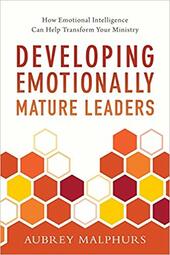As a youth pastor, I am a leader.
I lead students, adult and student leaders, parents, and in a variety of ways, colleagues.
As such, I constantly want to grow in my leadership skills. For that reason, I was excited to read Aubrey Malphurs' Developing Emotionally Mature Leaders: How Emotional Intelligence Can Help Transform Your Ministry.

The first thing to know about this book is that it reads more like a reference book – even an encyclopedia – than anything else. While it’s easy to digest in small chunks, it’s more difficult to explore all at once because the writing itself is not particularly compelling or story-driven. That said, Developing Emotionally Mature Leaders makes an excellent resource for any leader.
One of the things I appreciated about Aubrey is his clear articulation (and debunking) of the myth that emotions should be feared because they indicate “weakness and vulnerability.” I also appreciated that Aubrey’s work on emotions is grounded in both Scripture and research. He points his readers to Scriptural helps as well as secular tools designed to help them better assess and understand their emotions (and those of the people around them).
For me, the most interesting part of Developing Emotionally Mature Leaders was the chapter on various emotional maturity models. I especially appreciated the exploration of the Bar-On Model and Emotionally Healthy Pastoral Leadership. Aubrey focuses on the research of Jared Roth who uses this model to explore the relationship between emotional intelligence and pastoral leadership in turnaround churches. Jared found that “there were significant emotional intelligence differences between pastors of growing and declining churches on five factors: Emotional self-awareness: to be aware of and understand your emotions; Assertiveness: To effectively and constructively express your emotions and oneself; Independence: To be self-reliant and free of emotional dependency on others; Flexibility: the ability to adapt and adjust one’s feelings and thinking to new situations; And optimism: to be positive and look at the brighter side of life.” As a church worker, this fascinates me and fits with my experience.
Late in Developing Emotionally Mature Leaders, Aubrey states, “Leadership and team building specialist Paul Ford has worked with hundreds of church and mission agency leadership teams. He estimates that fewer than 5 percent are healthy teams.” Perhaps, with a greater understanding of emotional intelligence and maturity, the number of healthy teams within churches will increase. I certainly hope so. Developing Emotionally Mature Leaders has the potential to help do this by equipping leaders to take stock of their own emotional maturity and develop it in those they lead.
*********************************************
Disclosure: I received a free copy of Developing Emotionally Mature Leaders from Baker Books in exchange for a fair and honest review.